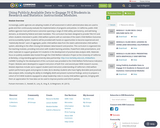
Increasingly, public agencies are adopting models of self-assessment in which administrative data are used to guide and then continuously evaluate the implementation of programs and policies. In California, public child welfare agencies track performance outcomes spanning a range of child safety, permanency, and well-being domains, as dictated by federal and state mandates. This curriculum has been designed to provide Title IV-E and others students interested in public child welfare systems with an overview of the state’s Child Welfare Outcomes and Accountability System. Students will be provided with hands-on opportunities to become experienced and “statistically literate” users of aggregate, public child welfare data from the state’s administrative child welfare system, attending to the often missing link between data/research and practice. This curriculum is organized into five teaching modules, providing instructors with student learning activities, PowerPoint slide presentations, and other materials to support graduate IV-E students in the development of practical data analysis skills. Materials focus on publicly available data hosted through the Child Welfare Indicators Project at the University of California at Berkeley, a long-standing agency/university data partnership: http://cssr.berkeley.edu/ucb_childwelfare. CalSWEC funding for the development of this curriculum was provided to the Child Welfare Performance Indicators Project. Modules were developed to support instructors of both first- and second-year MSW research courses. Module objectives include: (a) to support student (and instructor) understanding of California's child welfare system performance goals and progress to date; (b) to develop students who have highly desirable (and practical) data analysis skills, including the ability to intelligibly distill and present numerical findings; and (c) to prepare a cohort of IV-E MSW students equipped to adopt leadership roles in county child welfare agencies, bringing with them an appreciation for how data can be used to improve practice and inform policies. Putnam-Hornstein, E., Needell, B., Lery, B., King, B., & Weigmann, W. (2013).
- Subject:
- Social Work
- Material Type:
- Module
- Author:
- CalSWEC
- Date Added:
- 02/26/2018